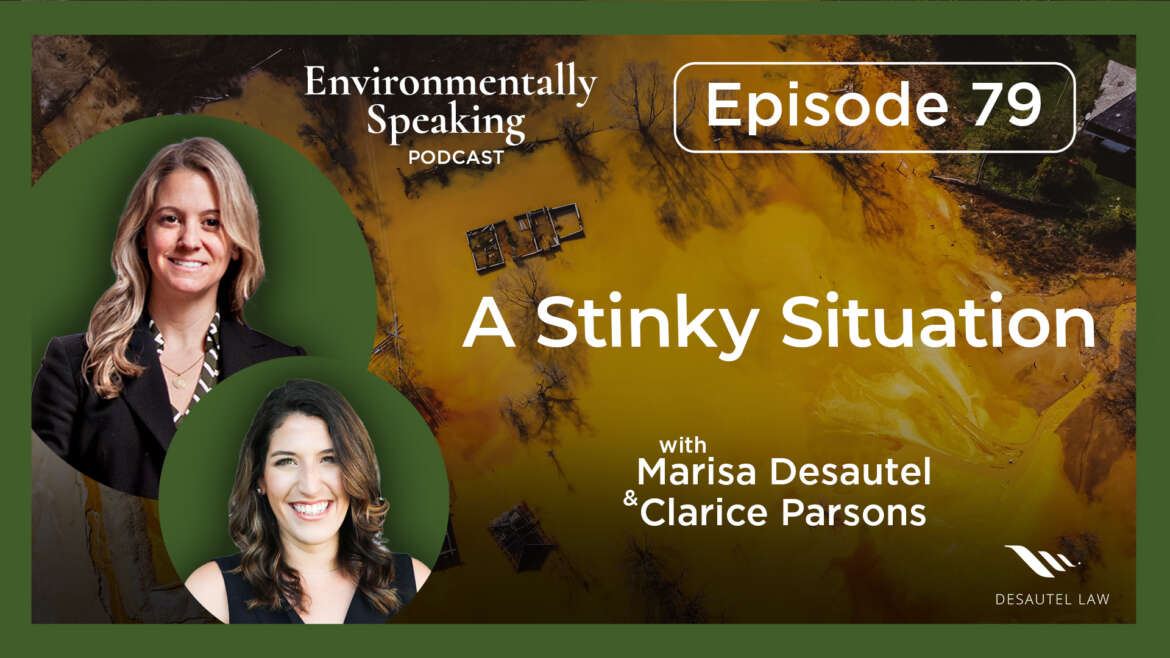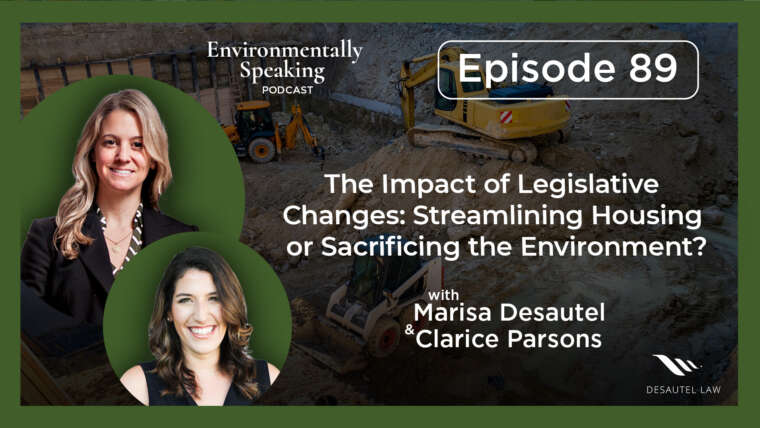Episode 79 Transcript: A STINKY SITUATION
CLARICE: Good morning, everybody. And welcome to this week’s rocky episode of Environmentally Speaking.
MARISA: Rocky episode?
CLARICE: Yes.
MARISA: I’m sure your explanation is going to be interesting.
CLARICE: I don’t know about you —
MARISA: Hi, everybody. I’m Marisa Desautel an environmental attorney here in Rhode Island.
CLARICE: I don’t know about you, listeners, but Marisa and I were talking this morning. I’m stealing this line from my coworker, but we have been saying all week at work Mercury is in lemonade. If anybody is an astrology fan or follower, personally I am not. We’ve been saying this joke, but it’s been a weird week, so we’ve just been joking and saying Mercury is in — I think the real saying is Mercury is in retrograde, but we’ve been joking and saying it’s in the lemonade.
MARISA: Yeah. I’m not much for following that stuff, but I do find it interesting when collectively it seems like everyone is just having a rough day or week, or in this case it’s been, I think, two weeks, and then you find out that Mercury being in the lemonade is at least partly to blame. It’s my understanding that this particular scenario has been in effect since April 15th or the middle of the month and is going to continue until the beginning of May.
CLARICE: Yeah.
MARISA: Everybody just hang on. Just hang on. You’re not alone. It’s been a rough week.
CLARICE: I don’t know. Is there comfort in commiserating in a group? Is that a thing? Well, hi, everybody. I’m Clarice and I’m in the lemonade with you.
MARISA: What are we talking about this week?
CLARICE: This week we’re talking about something gross and a bummer. My husband sent — and I think he is the I’m going to start referring to him as our unofficial researcher. He finds and sends us some really good articles. He found an article where our — I’ll link it in the show notes, of course. Rhode Island DEM announces the closure of certain waterways after Fall River accidentally releases 10 million gallons of partly treated wastewater.
MARISA: That’s disgusting.
CLARICE: Ten million gallons of accidentally released water.
MARISA: How much is that, 10 million gallons? Do you have an example?
CLARICE: So I started looking at an example and an Olympic swimming pool is 660 gallons. Or, no, I’m sorry, 660,000 so it’s, yeah, way, way more. Lots and lots of swimming pools. It’s so gross.
[0:03:13] MARISA: Okay. So an accidental release.
CLARICE: Yes.
MARISA: It would seem to me that based on my limited knowledge of the infrastructure comprising a wastewater treatment plant that it’s not like there’s a hose at the end of the treatment plant that discharges into a water body.
CLARICE: So I do have a little —
MARISA: [inaudible] understand if it was like one hose and someone like didn’t close the spigot or something, but I don’t understand how it just —
CLARICE: I do have a little bit more detail. According to this article, which is kind of my only sort of inside source of how this could have happened, apparently there was an electrical issue and a circuit breaker had shorted. And my understanding is when a circuit breaker shorted that caused the release. And now what I’m imagining is that caused a door or a valve to open, so its default setting was obviously to open up instead of keep closed. Am I an electrician, no. Do I work in wastewater, no. Do we now know about 10 million gallons of partially treated wastewater just out in the open, yep.
MARISA: And to me that seems like a system without adequate fail-safes in place, just no backup generator, no —
CLARICE: I don’t know. Maybe a second door on a different breaker.
MARISA: — emergency button that you hit. Hit the button and something else kicks in to prevent that situation from happening.
CLARICE: Yeah.
MARISA: We’re talking about human waste —
CLARICE: Yes.
MARISA: — going right into a water body that people fish in, swim in, recreate in.
CLARICE: Oh, it gets worse. So due to the recent heavy rains that we’ve been experiencing, that obviously has kind of helped move all of this partially — I keep saying partially treated because that makes me feel better. It’s still gross. The heavy rain flow has helped move this contaminated water into some shellfish farming area, so RIDEM has been informed. My understanding, they were informed within minutes of the failure and they were able to let the shellfish farming operations know and they have since been able to like assess and close areas of those farms down.
[0:06:39] MARISA: Was it like an aquaculture farm that you’re talking about, or was this just a shellfish closure issued by DEM?
CLARICE: It sounds like it was aquafarming. There is a shellfish hotline that you can call to find out if certain farms or certain areas were affected, but it looks like it could be a mix of both.
MARISA: [inaudible]
CLARICE: This article that I’m looking at has a map. It’s a big area. That’s a lot of water.
MARISA: What I was going to say is the DEM will customarily issue a shellfish closure and that just tells citizens don’t privately go and collect shellfish from this area, but it doesn’t necessarily mean that it’s an aquaculture or shellfish farm. If it were a shellfish farm aquaculture operation that was impacted, that’s a potential private civil action because then the wastewater treatment plant is impacting the company’s ability to make money. I’d be curious if it actually impacted an aquaculture farm or if it was just a shellfish closure from DEM.
CLARICE: From your expertise, what happens now?
MARISA: Not much.
CLARICE: What?
MARISA: Yeah. So DEM will, like I said, issue a closure which is necessary to protect public health and safety. They will then monitor water quality. They will monitor the wastewater treatment plant and request either daily records that are kept by the facility or wait for an update from the treatment plant itself to make a determination about when the threat is over. And, finally, they’ll decide whether they can reopen the area to shellfish harvesting. But some areas are so impacted by pollution that they remain perpetually closed to shellfish harvesting. Portsmouth, Rhode Island is a classic example where DEM closed Portsmouth Park and Island Park. Used to be a pretty popular shellfishing harvesting area and it’s been closed for as long as I can remember. So there’s some areas that are so impaired DEM just doesn’t allow shellfishing in them at all.
Another fine example of impacts from improperly run wastewater treatment plants is the Woonsocket wastewater treatment plant. And when you sent the link about today’s episode, I looked at it. Clearly it says Fall River, but I in my mind supplanted Woonsocket because Woonsocket is a notorious and continual violator where they have these events called upsets. And I just love that discharging sewage into a water of the state is technically called an upset in some instances because, yes, we are all upset. I wish that they would be more honest about what it is and just call it like a nasty discharge. An illegal nasty discharge would make me feel better, but, no, we’re going with upset.
[0:10:43] CLARICE: An upset sounds like a party foul. Like, oh, it’s just a little upset.
MARISA: Right. Yeah. That’s what I mean.
CLARICE: How casual.
MARISA: Super cas. It’s kind of like — so I’m vegetarian and I don’t — listen, people eat what they want. I get it. For me, I have a real problem with animals suffering, but it’s the same concept as folks that like to eat veal. We call it veal because that’s more acceptable than saying a little baby cow because that’s what veal is. It’s a little baby cow. You put a different label on it and it becomes more acceptable in our society, so we call these events upsets. It’s also very passive aggressive. It’s almost like it happened. It was no one’s fault, you know, which is not the case. As we know with any type of activity, human error and judgment are often the reasons behind failure.
CLARICE: These upsets.
MARISA: Upsets. In the case of Woonsocket, the situation with the Woonsocket wastewater treatment plant got to a point where the upsets, the discharges, were so egregious at the Rhode Island attorney general and the Department of Environmental Management sued the municipality, basically saying, we’ve had enough of your shit literally.
CLARICE: Pun intended.
MARISA: Yes. Pun intended. And I believe that that civil action was brought in March because of ongoing discharges from that facility and the complaint names the City of Woonsocket as a defendant as well as Jacobs Engineering Group Incorporated and Synagro Woonsocket, LLC because they’re the operators of the plant. The city owns the plant, but they hire folks to come in and actually run it and do the work because the city doesn’t have the staff or the expertise or the resources to do that. So the civil action names both the city and the people that were operating the plant.
The impacted water body is the Blackstone River which, if you know anything about the Blackstone River it’s already an impaired water body. There have been a lot of efforts to clean it up and to restore the watershed in general, so this was not a good look for the city of Woonsocket. The officials, including DEM, indicated that they’d sent several letters of noncompliance to the city for failing to follow the conditions of their discharge permit, so this is not a situation where Woonsocket — sounds like with Fall River — had one upset. And as upsetting as that is, they recognize the situation. They’re addressing it. They’re taking steps to come into compliance. It seems like with this Woonsocket situation Woonsocket was like, eh.
[0:14:30] CLARICE: Oh, well.
MARISA: We’ll get to it, you know. So the fact that the state is suing a municipality is a big deal. It’s always a big deal.
CLARICE: Now, is there any — knowing that this is a Massachusetts incident that’s now moved into Rhode Island waterways, from the limited info that we have it sounds like the two organizations are — they’re in communication right now, but are there extra steps or extra hurdles or difficulty that we can expect knowing that they’re from different states, or do you not see that being a factor in this?
MARISA: Rhode Island can and has issued notices of violation and other notices of noncompliance to wastewater facilities that are so-called upstream of Rhode Island waters. It doesn’t matter that the facility is not located in Rhode Island.
CLARICE: Okay.
MARISA: The long arm of DEM can reach to any state that is impacting Rhode Island.
CLARICE: Okay.
MARISA: So that’s how that works.
CLARICE: Yeah. I also found on DEM’s website they have an interactive map of what areas are allowed and prohibited for shellfishing right now and it looks like just from the Fall River incident — oh, I had asked you to tell me the name of the river again, the Kickamuit River.
MARISA: Right.
CLARICE: As a result of that we’re looking at over 4,000 acres are shut down.
MARISA: I believe the Kickamuit is in Warren or next to Warren.
CLARICE: Yeah.
MARISA: Yeah.
CLARICE: Yeah. It’s, yeah, Bristol, Warren, parts of Tiverton. It’s a huge area that’s blocked off. We’ll link that in the show notes. If there are any updates, we’ll kind of follow this along, but, I mean, it was 10 million gallons of water —
MARISA: A lot of water.
CLARICE: — followed by heavy rains.
MARISA: Yeah.
CLARICE: So gross.
MARISA: Yeah.
CLARICE: So gross.
MARISA: So you can’t harvest shellfish in that area now. You also are advised not to recreate.
[0:17:17] CLARICE: Yeah.
MARISA: If you were planning on taking your kayak or your canoe —
CLARICE: Don’t.
MARISA: — don’t do it.
CLARICE: Don’t. Don’t. What if you fall out of your boat. Gross.
MARISA: One last thought here I wanted to add about the Woonsocket situation. In reading about the response from the City of Woonsocket as a result of the lawsuit filed by DEM and the attorney general’s office, I just love this. Like instead of the city saying, geez, we caused quite a mess, you know, we apologize, we’re working to fix it — no. Instead we get this statement from whoever it is in Woonsocket, maybe the mayor — the public works director Steve D’Agostino and the mayor Lisa Baldelli-Hunt.
We get this statement from them that they find that the lawsuit is disappointing, unnecessary, and unprecedented. Like that’s the way to deal with this situation. Act like the victim, right. Act like the victim and act like the state is unreasonable and you’re disappointed and it’s never been done before, so why should it be done now. Like those are just asinine responses as far as I’m concerned. And the other part of the statement is the public works director here Steve D’Agostino says, I’m not saying we’ll never had another upset, I won’t say that, but we’re trying to do everything we can to prevent it. That’s the end of the quote.
CLARICE: Well, on that note I’m going to go have my own upset.
MARISA: I don’t know what that means, but okay.
CLARICE: This is disappointing. This is disappointing all over.
MARISA: You feel disappointed? Yeah.
CLARICE: I’m exceptionally disappointed.
MARISA: Are you disappointed?
CLARICE: I am. I’m disappointed in Lisa, in Fall River’s wastewater treatment plant. Oh, God. What a bummer.
MARISA: You know, you used that phrase at the top of the episode. You just used it again. Are you doing that on purpose, a bummer?
CLARICE: Oh, gross. No. I have nothing left.
[0:20:04] MARISA: All right. Let’s wrap it up. Mercury’s in lemonade.
CLARICE: Tell us how your week is going. If you’re not affected by Mercury and the stars, good for you. Stay safe. Reach out to us on the socials. We’re on Instagram, Twitter, Facebook. You can watch our videos on YouTube at Desautel Law. Send us an e-mail at Help@DesautelESQ.com. I guess stay out of the water. Have a good one.
MARISA: Thanks, everybody. Bye.




